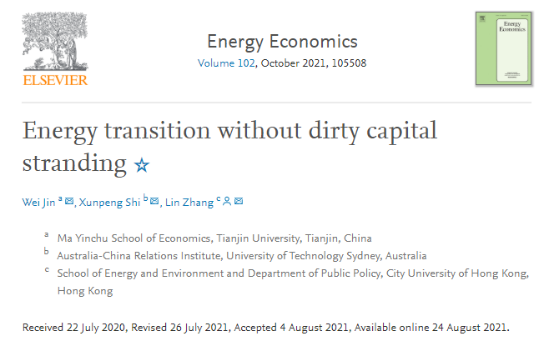发布日期:2021-08-29

Energy transition without dirty capital stranding
Wei Jin, Xunpeng Shi, Lin Zhang
Abstract
Avoiding dirty asset stranding matters for protecting wealth and employment in the economies that are rich in pollution-intensive fossil energy and resource assets. This paper analyses, empirically and theoretically, the mechanism for energy transition without dirty capital stranding. We show that a shock that tightens pollution regulations will lead to downward adjustments of capital stocks, investment, capital values, and outputs. However, when the transition includes dynamically accumulating clean capital to induce green structural change, the transition path will move to an equilibrium where both dirty and clean capital can coexist and grow simultaneously. Clean capital, by eliminating the polluting effect of dirty capital, protects the economic values of dirty capital and thus mitigates the extent of dirty capital stranding. When the preference has a unitary elasticity of substitution between consumption and environmental goods and there is no adjustment cost in clean capital accumulation, the energy transition can occur along a balanced growth path with sustained growth of consumption, production, and capital stocks in the long run.
摘要:
针对化石资源丰富经济体的低碳能源转型之路,如何避免碳密集能源资产搁浅对于保护财富、产业以及就业至关重要。本文从实证和理论层面分析了避免碳密集资产搁浅的能源转型机制。研究发现,能源清洁转型需要实施控制环境污染外部性的规制政策,但是环境政策冲击将导致资产价格降低、投资减少、产能收缩以及资产搁浅问题。然而,通过积累清洁资产来诱导资产结构变化时,能源转型过程将转向一个没有资产搁浅的平衡增长路径,即清洁资产和化石资产可以共存并持续增长。清洁资产通过消除化石能源资产的污染效应,保护其经济使用价值,从而减轻能源转型过程中资产搁浅的程度。另外,当个体对于商品消费与环境质量的偏好具有单一替代弹性且清洁资本积累不存在调整成本时,能源转型路径可以实现消费、生产和资本存量的长期持续增长。
研究意义:
如何在能源转型过程中避免大幅资产搁浅是实现清洁能源平稳转型和碳中和目标的关键。常规能源转型模式通过开发清洁能源来取代已有化石能源,将产生对化石能源资产价值的创造性破坏。而建立在化石能源储量之上的污染型资产(如燃煤电厂)将面临资产搁浅的风险,化石能源资产的大量搁浅也将带来为财富损失和失业问题。因此,诸如欧佩克、中国、澳大利亚和俄罗斯等资源丰富经济体将有强烈动机去探索一条能够回避资产搁浅的清洁能源转型之路。政策制定者如果继续选择传统转型模式,清洁能源对化石能源的替代效应将带来资产搁浅和财富损失的风险。相比之下,本研究所提出的转型机制将有助于政策制定者形成避免资产搁浅能源转型的思路
文章全文参见链接:
https://www.sciencedirect.com/science/article/pii/S014098832100390X?dgcid=coauthor